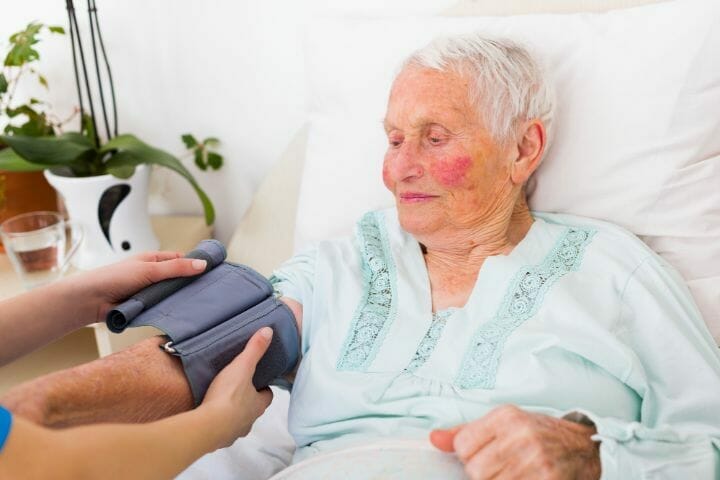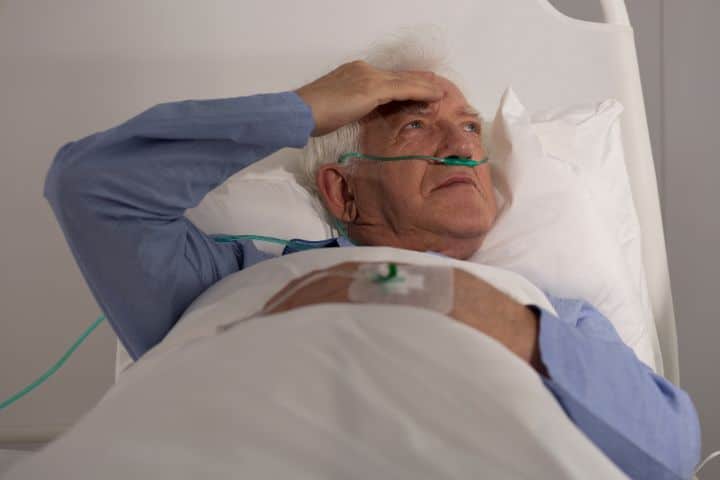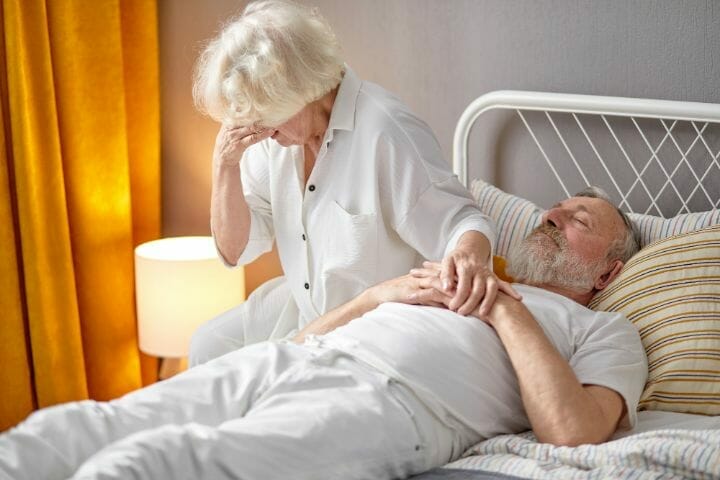The answer to this intriguing question is more often than not, yes.
For the elderly who are terminally ill or have been ailing for too long, recognizing the signs of death approaching can be overwhelming and not very easy for them or their loved ones to deal with. But it is only natural to be able to start seeing these signs as the end of time nears for that person. Gaining an awareness of these cues tends to eventually help the person and their family in preparing for what is inevitable.
In this article, we explore the symptoms that an elderly person can expect to develop in their last days and how to brace up and cope with it all.
Listed Below Are a Few Signs That Can Indicate That Death Is Near
1. Change in Vital signs
As death approaches, vital signs tend to change in many ways. Here are a few:
- Irregularity of heartbeat
- Dropping blood pressure
- Changes in breathing patterns- ability to hold breath for longer while gasping for breath at other times. Older people tend to lose control over their breath as the last days’ approach.
- Darkening of urine, which is a sign of kidney giving up
- Drop-in body temperature by a degree or so
- Irregularity of pulse
It is to be noted that these may or may not happen and it is best to consult a physician so as not to falsely interpret or over analyse changes.
While all of this may sound distressing to the elderly or their loved ones, none of these changes may be necessarily physically painful.
2. Physical Signs
For older people, their skin starts getting paler and thinner than before, coupled with dark liver spots on hands and feet. Their hair also tends to become thinner. They tend to shrink in stature overall.
Discoloration and darkening of teeth and nails are another sign of extreme old age. (All the above are normal physiological changes of aging and may not necessarily suggest approaching death.) All these are a result of reduced blood circulation in the body due to a change in vital signs.
They may experience increased perspiration, congestion, and cough. Their speaking decreases before they go completely silent, in some cases. Sometimes these periods of inactivity and quietness may get interrupted by sudden movements of the dying person’s limbs
3. Increased Sleep
While ailing people may complain of disturbed sleep, it is natural for older people to sleep longer in their last days. This is due to the slowed-down breathing and heart rate.
For the same reason, even in their waking hours, it is hard for the elderly to physically exert themselves in any way. Moreover, they may tend to drift in and out of consciousness now and then. In the last 3 months or so, the ailing elderly tend to spend less time awake. This is all due to the changes in breathing and heart rate that lead to a weakened metabolism.
The only thing caregivers should do in this case is to make the elderly as comfortable as possible and let them sleep. And in the waking hours, when the elderly have some energy, they should be encouraged to move a bit and get out of bed to avoid bed sores from developing. Overall, the need to rest during the day becomes higher and the ability to wake up easily in the morning diminishes consistently.
4. Reduction in Appetite
This is only natural, given the slowed metabolism and an increased need to sleep. The body automatically reduces the food intake as it no longer needs the fuel to the extent it did before due to a reduced number of waking hours. This is one of the reasons why they tend to shrink or lose weight in their last days very rapidly.
It is best to take some guidance from the doctors and nursing staff on dietary concerns instead of force-feeding the elderly. It is best to just let them eat whenever they feel hungry (controversial line). A steady water intake is key. That is something that shouldn’t be overlooked.
It is also possible that the person may just completely stop eating anything at all just a few days before they die. Water nonetheless must be consumed to some extent for hydrating the body and avoiding further discomfort. In cases where older people simply refuse food and drink completely, it can be a sure sign of resignation to their imminent mortality.
Also, for the elderly who are consuming medicines for an ailment, it becomes necessary to follow some bare minimum dietary protocols so that they can consume their meds without damaging their already frail kidneys further. A bit of discipline can help increase their longevity to some extent. If the patient stops eating, they have to be put on a liquid diet through Ryle’s tube immediately.
You may also like What to Wear to a Funeral Viewing?
5. Changes in Toiletry Habits
This is a fallout of the decreased appetite. When an elderly person stops eating and drinking as much, it is only natural for them not to want to pass solid waste that often or regularly.
The same goes for their urinating frequency. However, it must be noted that not passing urine generally for 2-3 days or more is a serious life-threatening medical emergency. It is advisable for caregivers to keep a tab on this. Also, in general, the elderly, due to weaker bladder muscles, lose control over urination. It is important to keep them clean at this stage.
6. Weakening of Muscles
In the last few days, the elderly tend to develop weak muscles to the extent that it may be difficult for them to get up from the bed, turn over or carry out any of the simple tasks they could easily do earlier.
Their loved ones can provide a lot of emotional and physical support by just being around and helping them lift things or move around with their support. Mobility devices and any sort of technical support also help a great deal in easing movements for the elderly in such cases.
7. Drop in Body Temperature
This is a sure sign that very little blood is flowing to the hands. A reduced breath and heart rate is the reason why the blood thickens up and flows at a slower pace through the body.
Moreover, the blood flow focuses mostly on the internal organs that are working with a lot of trouble, rather than other parts of the body which are anyway more inactive than ever before, like the hands and feet. The most visible sign of this is that the skin of older people tends to look paler or develops purple or blue patches here and there.
Also, while the dying person may not feel too cold themselves, they will surely be cold to touch. Just keeping them well layered and comfortable is the best thing one can do in such a situation.
8. Increased Pain
The elderly and ailing person’s pain levels tend to steadily increase in frequency and intensity as they approach death. Their pain threshold on the other hand reduces.
The impact of this combined effect can be very hard to witness for a loved one. Administering pain medication is the last resort in such cases. The idea is to make the dying person feel as comfortable as they can, by reducing the constant and intense pain they experience.
You may also like How to Pay for a Funeral With Little to No Money
9. Detachment From Their External World
This is common in the last few days or weeks when the dying person no longer shows any interest in leaving their bed, let alone wanting to talk to anyone.
A lot about their behaviour changes, be it their mood, expressions, words, etc. For some, anxiety levels tend to increase, others may experience a shift in their political or religious views. Some of them may become exceedingly anti-social.
10. Change in Interests and Habits
The dying person’s interests may also change. In the sense, if they liked to watch television a lot or listen to the radio a lot earlier, they may want to reduce or stop that gradually.
If they went for frequent walks earlier, they may reduce or stop that. They may not want to meet their friends that often or spend time talking to their family members either. Their habits might shift too. If they liked to have their meals on the table, they may start having them in bed instead and so on.
11. Expressions of Departure
- The dying person may start to express that they will be ‘leaving the world soon, or ‘embarking on their onward journey. Words like leaving, going far away, moving to the final destination may be something the family members might hear them saying a lot in their last days. They may also start having farewell conversations with their near and dear ones, showcasing their gratitude for their support and care.
- As per Tornstam’s theory of gerotranscendence, the dying person may want to go over their childhood memories and trace their life’s journey to the present moment. They may also want to suddenly reach out to long-lost friends or relatives whom they may have lost touch with within the recent past. Alternatively, their family members and caregivers may often find them sharing their life experiences with them in great detail in their last days. This is also a way for the dying person to bid adieu, give back and share their learnings with their progeny or loved ones.
- Another aspect of this theory of gerotranscendence is that the dying person experiences a reduction in the fear of death and therefore they can talk about it in greater depth. In their last days, the person typically accepts or resigns to their mortality and understands its eventuality. There may either be a detached sense of calm or restlessness on the other hand due to a growing sense of curiosity towards the unknown journey ahead. While it may be tough to talk about dying, if the individual does so, their caregivers must let them express their feelings.
- The caregiver can also assist the individual in helping them connect with people to apologize for their mistakes, forgive others’ mistakes, show gratitude and love towards those who matter the most to them, and bid adieu to their near and dear ones.
You may also like How Long After Death Is a Funeral?
12. Making Special Demands
As the elderly person approaches their last days, they may suddenly start placing special requests on their family or caregivers, for example wanting to have a loved one around them all the time, or a particular kind of music to be playing in their room, certain photographs they may want to keep by their bedside or just being surrounded by flowers.
13. Feeling Confused
It is natural for someone to feel confused and disoriented now and then in their last few days. The brain is largely active even if the person is dying, however since the person frequently zones out, sleeps more, and withdraws from the external world, they tend to have periods of confusion in the waking hours.
Caregivers need to explain things that are happening around to the ailing person to help them find their bearings. Moreover, the changes in their behaviour and expressions might be surprising them as well, so a large part of the confusion arises out of these changes as well.
14. Worrying
The dying person tends to experience an increased level of anxiety that may show up as anger or frustration. This may be seen in their expressions or tone more than their words as they anyway speak fewer and fewer words in the last days. Their worry may also be due to the confusion and disorientation that they experience.
You may also like How Do Elderly React to Death of Their Significant Other
15. Hallucinations
A dying person often has hallucinations or distorted visions in their final days. This is nothing to get alarmed by. It is just a result of the distress they are under physically and mentally.
They may forget to recognize extended family members or even their partners at times. They may not remember simple events of the recent past and may tend to make up things or state things the way they want to.
At this time, it is best not to correct or argue with the individual and just let them express themselves. It is best to listen and go along with them.
The idea is to just let them feel loved and not waste any time whatsoever in adding to their distress. The last few moments are precious and fleeting, so it is advisable to just be around them and care for them to the best of one’s ability.
A couple of days before dying, the person may experience a short-lived surge in energy levels. It is disheartening when their loved ones see this as a sign of them getting better. On the contrary, this is a sign of their forward movement towards dying.
In the final hours, the organs start to shut down and the body more or less stops working. But the person can often still hear all the sounds around them, even if they don’t express or react to them much. Hearing is one of the last senses to leave. It is because of this reason that the caregivers should keep talking positively to the loved one at that time.
In the last hour or so, Cheyne-Stokes respirations or erratic rapid breaths followed by short periods of no breathing at all may occur. This is very uncomfortable for the dying person and extremely overwhelming and unpleasant for a loved one to watch. Unfortunately, this is a natural part of the dying process and nothing much can be done about it, except providing oxygen support or morphine to ease out the gasping due to air-hunger. More can be read about it here.
Death typically happens in two stages, clinical death which occurs when the person’s heart stops beating, and the biological death that occurs 4 to 6 minutes later when the brain cells die from the loss of oxygen due to a stalled breathing. The other organs of the body follow suit. Resuscitation is possible at times if clinical death occurs but not at the stage of biological death. Doctors can delay the biological death by cooling the body and thereby helping it slow down its metabolism rate and use of oxygen.
While the causes and visible symptoms leading to death may vary, all of them lead to either asphyxia i.e. oxygen deprivation and suffocations, Coma i.e. prolonged unconsciousness that looks like one is sleeping, and Syncope i.e. fainting or passing out. Either of these happen just before the moment of death.
In the final moments, a person may experience their life flashing in front of their eyes. In a study done at the University of Michigan in 2013, dying rats were seen to display high levels of brain waves right after their heart-beats stopped. Multiple other studies have been done on this aspect of dying but nothing can be said with full clarity.
You may also like How Do Elderly React to Death of Their Significant Other
To Sum Up
Death due to old age or illness is an intuitive experience that is unique to each person. It comes in the form of a personal journey that the individual has to just go through and make sense of in their way. Death is inevitable for all. In their last days, both men and women by and large go through a similar process.
However, it can be said that while women may be more likely to revisit their past lives and relations with other people, men are more likely to withdraw so as not to be seen as helpless or needy. That said, everyone will surely like to go over their lives and sort out regrets in some way or the other in their last few days.
Japanese author, Haruki Murakami summed it up aptly in his quote- ‘Death is not the opposite of life, but a part of it. Another perspective to this by J K Rowling states that ‘ To the well-organized mind, death is but the next great adventure’.
More often than not the dying person can take a cue from these well-known signs and symptoms and gauge their mortality in the coming days. Even if not, it is a great idea to follow the practice of meditating on death even as youngsters.
In Buddhist culture it is called Maraṇasati, (the mindfulness of death, or simply death awareness). This is the practice of keeping in mind the fact that death is inevitable and can strike anytime and hence remembering to make the most of this human form of life and walk the right path.
The best that anyone can do during these last days, is to be by the side of the elderly or ailing family members who are about to leave the physical world and provide them as much emotional and practical support that they can in the final days of their life.








